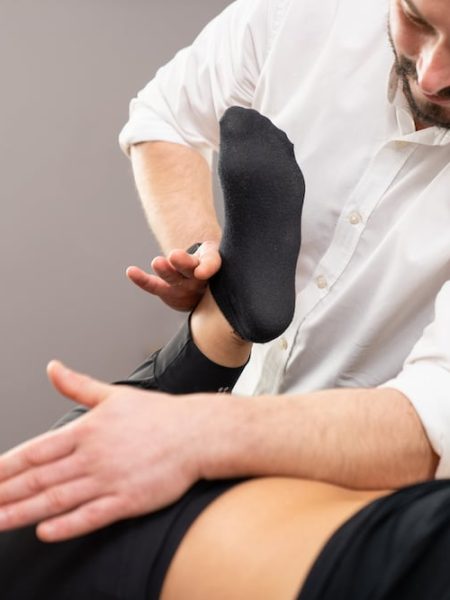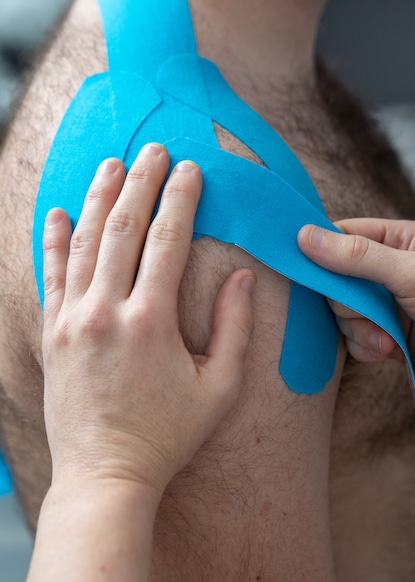The majority of medical insurance companies cover Physiotherapy. The Hatfield Practice enjoys specialist status with Bupa and PPP. Most now refund part or all of patients fees; some have special conditions or require that you tell them at the onset. It is best to check with your insurers first, sooner rather than later, as individual policies may have exemptions. If you do have complimentary health cover, then you should obtain an authorisation number.
Physiotherapy treatment
Physiotherapy can make such an enormous difference to your quality of movement and life



Why Physiotherapy?
Physiotherapy is beneficial and cost-effective. Regular Physiotherapy can make an enormous difference in the quality of life. Regular Physiotherapy after surgery, accidents, or even an illness will speed recovery. Studies have shown that it may reduce painkillers and reduce the risk of ongoing pain. Physiotherapy is perfect for treating everyday mishaps, work, or sports injuries. Physiotherapy provides preventative exercise-based treatments, often combining deep tissue massage, electrotherapy, acupuncture, and manipulation. Physiotherapy works well to reduce pain, relax muscles, and exercise without pain may strengthen the body.
Our Approach
These days Physiotherapy involves looking at the body in a ‘holistic’ way, as a whole person, rather than focusing on individual anatomical areas. The physiotherapist will look for the primary or root causes of pain and dysfunction within the patient’s muscles and joints. Physiotherapists help educate, encourage, and help the patient recover.
Reducing any risk of ongoing injuries is essential. Hatfield Practice Physiotherapy will provide you with excellent preventative treatments and rehabilitation. One to one Physiotherapy will provide you with post-surgical and rehabilitative plans, helping you to recover fast. The Physiotherapist will teach you exercises and show you how to apply your own effective treatment methods. Hatfield Practice believes that you will find it hard to beat the experience and the teamwork we can offer.
What to expect
Your first consultation can take anything from 30 mins up to an hour, including:
- Medical Questionnaire
Your first treatment will involve a medical history questionnaire. The Physiotherapist will ask you questions about lifestyle, family history, medication and any previous injuries that you may have had. The initial history is essential as its specially designed to clarify facts and help rule out existing conditions or problems.
- Clinical diagnosis and treatment plan
The information gained from the medical history and examination will help the Physiotherapist decide what it is that causing the problem or pain. This is called a clinical diagnosis. From the diagnosis, they will formulate a treatment plan for you. The Physiotherapist will carefully discuss your treatment options and methods, with your agreement set goals.
- Examination
After the medical history, the Physiotherapist will carry out a gentle and thorough examination of the injured or painful area. The examination helps the Physiotherapist to identify any likely areas that may be causing the pain. Straightforward clinical checks like blood pressure, reflexes and neural (nerve) tests are often performed. We will also use gentle movement techniques to palpate and assess spinal joints or restrictions within your muscle, ligament and skeletal system.
- Aftercare and follow up
Depending on your type of treatment, Physiotherapy aftercare can vary in nature and length. Aftercare and follow-up treatments are usually vital to the success and efficacy of treatment. The most important factor is, of course, that you follow the therapist’s advice. After treatment, you may receive further advice and a functional exercise plan. We will set goals that are rewarding and attainable. Physiotherapy treatment will often precede an exercise plan. Exercises help to build upon the therapy itself and provide an additional benefit that medication alone cannot provide.
Who we treat
Physiotherapy is excellent for people of all ages and activity levels.
As we all live longer, our bodies must be kept as mobile and pain-free as possible. Our physiotherapists provide exercise rehabilitation and effective treatment. Physiotherapy improves the ability to live an active, independent, and healthy lifestyle, bringing confidence and energy. Importantly Physiotherapy can provide detailed specific advice and guidance during rehabilitation or injury. In part, Physiotherapy works by improving the body’s mechanical function. The improved function helps us feel better, gain emotional confidence and improve ranges of movement.
Physiotherapy can improve performance and efficiency during sports and activities by improving balance, technique, blood supply, and strength. For many, improved physical conditions may help reduce the risk of injury and improve overall confidence.



And finally....
Physiotherapy works. For many patients, the goal is first to relieve pain. Then correct faulty posture or habits by strengthening muscles and becoming aware of patterns that lead to problems and pain. One of our goals is to try to prevent a recurrence of the original injury through education.
Physiotherapy can help.
- Osteoarthritis, spinal scoliosis, rheumatoid arthritis, many types of injuries, pain, swelling, general stiffness.
- Back and neck pain – protruding or prolapsed discs, e.g. trapped nerves or ‘Slipped Discs’, numbness and weakness.
- Frozen shoulder, RSI, tendonitis, tendinosis, carpal tunnel & Achilles tendonitis, plantar fasciitis.
- Knee Injuries respond very well. Including Ligament & Cartilage damage including pre /post-operative strengthening.
- Sciatica, degenerative discs, many types of nerve pain, muscle weakness and neurological.
- Restless leg syndrome, Pain and aching around the legs at rest and night.
Physiotherapy can help you feel better.
- Sports Injuries – commonly muscle pain, ligament sprains, cartilage crush/swelling, knee/hip capsule and tendon problems.
- Muscle and ligament tears/ strains. Stiff necks respond very well. Painful backs respond very well and often resolve quickly.
- Whiplash, any physical trauma, rugby, falls, RTA’s, medical-legal claims, rehabilitation to aid recovery after surgery.
- Physiotherapy can help fractures and spinal Injury. Tennis elbow/ golfers elbow, tendonitis, crush injuries at work etc.
Physiotherapy can help your posture.
- Postural problems resolved, including painful neck muscles, stiff shoulders.
- Discomfort due to poor habits.
- Ergonomic advice for manual workers and computer users.
- Physiotherapy can help by improving your bodies range of movement and dedicated exercise plans.
Physiotherapy can help Pre & post-operative rehabilitation.
- Joint Replacements respond well to physiotherapy.
- Physiotherapy can help you recover after spinal surgery Fractures rehabilitation and function improved.
- Pre & Post Arthroscopy on knees. Physiotherapy reduces pain and improves mobility.
- A.C.L. Reconstructions. Physiotherapy encourages exercises to strengthen and helps to increase the range of motion.
- Scar Tissue Treatment.

What Our Patients Say
Have been to numerous physiotherapists and osteopaths over recent years and feel I have finally found the Hatfield Practice where they combine the best of both disciplines, along with other complementary ones – how refreshing! Am being treated by Damien who clocked my problem(s) in a few short minutes and so far I’m doing really well. And their charges are extremely reasonable. Very Impressed.
Very friendly and honest, have fixed my lower back pain after a previous physiotherapist just insisted on lots of expensive treatments that didn’t help. Highly recommended. Thank you. Stefan
Thank you Dora top class Physiotherapy – I feel stronger each day now.
Great exercise advice, my shoulder was painful before but now feel so much better more mobile and zero day to day pain. Well done”
Our Physiotherapists
FAQ's
There is free car parking at the front of the practice. There is also one-hour free parking in bays across from the Hatfield Practice in Ground Lane. If you get lost, please call the reception on 01707 888229
The receptionist will ask you to complete a registration form.
When you arrive for your first appointment, your Hatfield Physiotherapist will take a detailed case history asking how the problem started, your symptoms and any relevant past medical history. They will then carry out a physical examination to discover the origin and extent of your current problem. Your Physiotherapist will give a full explanation of your problem, together with an outline of the appropriate treatment, rehabilitation. If possible, an estimate of the number of treatments you may require.
Treatment will begin at your first visit. Following the first assessment/treatment session, your Physiotherapist will often give you a regime of rehabilitation exercises to continue at home.
You do not need to make any special preparations for your first visit, other than wear clothing that you feel comfortable in and allow easy exposure of the area to be examined and treated. If there are any worries, please ask as we want your experience to be a pleasant one.
Please let us know if you require an urgent appointment, and we will do our utmost to see you as soon as possible. Please tell the reception staff about your situation.
Their doctor refers to many patients, but it is not necessary to see them first. However, if you wish to claim on your Health Insurance, some companies require a doctor’s referral as with any other specialist or consultant.
All our Physiotherapists are Chartered and registered with the Health Professions Council. A Chartered Physiotherapist is a member of the Chartered Society of Physiotherapy (MCSP), the professional regulatory body of the profession. This means that the Physiotherapist has undergone an approved course of training (usually a 3-4 year degree course) and is governed by a professional code of practice. The Physiotherapist is also insured to provide treatment services. Besides, all our Physiotherapists have undergone post-graduate training to specialise in their particular field.
We are committed to continuing professional education. As a Practice, we review each other’s work.
There is no fixed amount for an appointment, although they are generally in 30 to 45 minutes. Conditions vary considerably in the time required, and we are committed to achieving the best for you. Most patients improve considerably after 3-4 visits.
Remember that what is achieved inside the consulting room is only a proportion of the Physiotherapist’s work. It is necessary to write detailed notes, communicate with GPs, review hospital X-rays and scans, write reports, liaise with staff and upgrade our skills.
For a list of the current fee for all services, please click here. They can also be found at the reception desk. Fees are payable at the time of your visit by cash, cheque or credit card.
We are very aware of the few but significant risks from manual therapy and the potential for certain serious conditions to behave like musculoskeletal problems. All our Physiotherapists are trained to screen for these risks before they commence treatment. If there are any doubts, the Physiotherapist will alert you and contact your GP to advise them of the assessment findings.
In short, there are many manual therapy techniques, exercises and orthotic devices (including taping) that the Physiotherapist can use. These will be tailored for your specific set of problems/symptoms. Physiotherapists work with their hands using a highly trained sense of touch with treatment, including passive mobilisation and specific joint techniques, massage and other soft-tissue techniques, electrotherapy devices and your own specific exercises for your condition.
Yes, and any other relevant medical information you may have.
No, but there is good research evidence that exercise can significantly reduce symptoms and pain associated with these common problems. Several techniques aim to improve function and reduce the pain and discomfort of the muscles, ligaments, and joints. Physiotherapy practitioners can also advise on how to help manage these problems at home or in the workplace.
Physiotherapy is not inherently painful, but some discomfort is likely experienced when an injury is treated, even with gentle techniques. Your Physiotherapist will be sensitive to your symptoms and discuss the treatment options with you before starting on an agreed programme. Occasionally, there may be short-lived side effects. For example, manual muscle trigger-point release can be very painful at the time. Still, the pain is often described as ‘good’ and fades quickly during the technique, reducing pain in the original problem after. We will always find alternative options if you find a particular treatment too uncomfortable.
We do not believe the old saying, “No pain is no gain!”
Side effects are generally rare, but you may experience some tiredness or soreness for a few days afterwards; for example, some forms of muscle-strengthening cause an ache in the muscle usually experienced a few hours after exercising and persisting for up to a day. Your Physiotherapist will adjust the treatment programme according to how you respond to treatment.
If you have new problems or concerns between treatments, we would rather telephone us as soon as possible than be anxious or in pain in silence. If the Physiotherapist is busy, we will return your call as soon as possible.
This depends on the problem and its severity. In some cases, particularly when the pain is severe, it is more effective to see you again within a few days. Generally, treatments are spaced roughly one week apart, although your visits may be spaced more widely as the condition begins to improve. Your recovery rate will also depend upon several other factors, including your age, general health, sensitivity to treatment and general activity level.
Some patients feel that they benefit from a Physiotherapy MOT which may require visits on an occasional basis.
Not usually, but this depends entirely upon the problem. Some long-term conditions such as forms of arthritis and muscle wasting may vary month to month, and occasional top-up treatment or tweaking of exercises may be beneficial.





